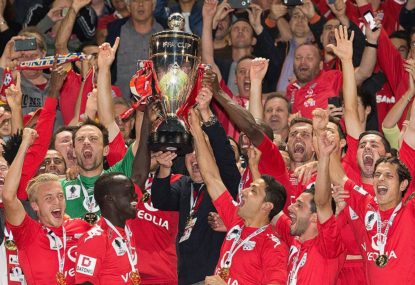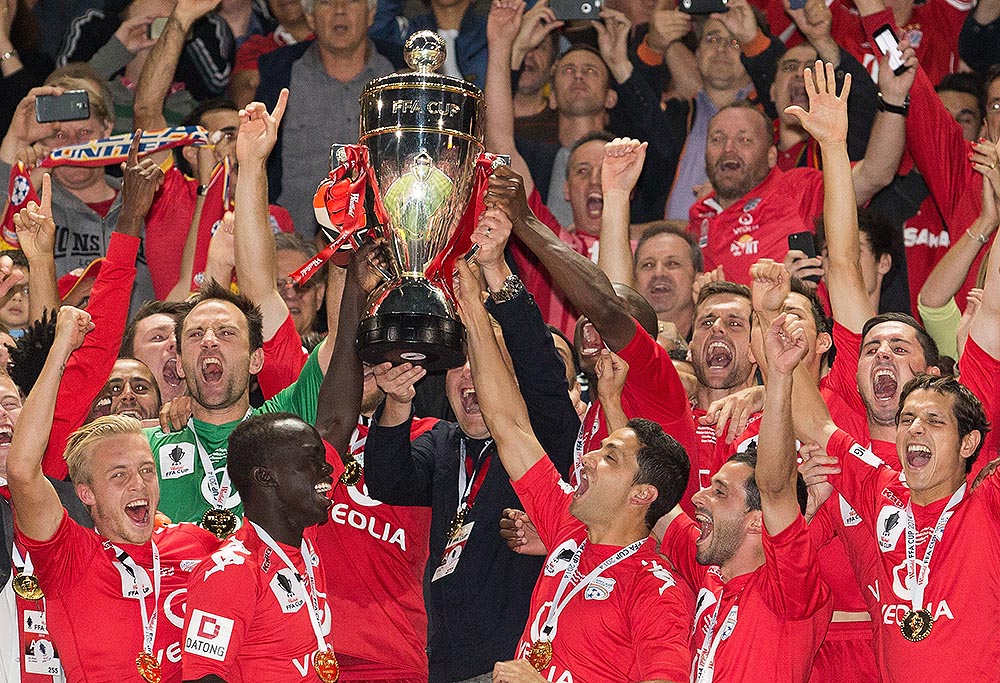Controversy as Villa keeper handed second yellow for shootout crowd taunting... but isn't sent off
Emi Martinez was saved by a new rule that resets yellow cards at the end of extra time, meaning his second yellow for taunting…

David used the thumb recognition sensor on the arm rest of his lounge to turn on the projector.
Nature chirped and danced in the frangipani directly outside his window as the staff of the Greenwood Aged Care Facility began preparing dinner for the 200 residents.
David had made alternate arrangements for this particular Saturday night and would stay away from the dining room altogether. The small refrigerator in his kitchenette stored a few instant meals requiring only reheating.
A quiet feed in his own room was on the cards. When the final of the FFA Cup is on uninterrupted focus is required.
The biggest night in Australian football grips the nation, as it has since 2014 when Adelaide United held the trophy aloft in their home city.
Now 50 year on, the cup has evolved into the most cherished pieces of silverware in the country.
The early years were tough, with much media attention focused on the minnows and their vast challenge in taking on the then ten powerhouses of the A-League.
The mockery often levelled at a supposedly soulless competition in which complete amateurs faced professional squads fuelled a media bias. That prejudice boxed the public into thinking with the same narrow-minded thought patterns that plagued Australia’s acceptance of the world game throughout the first 250 years of the nation’s history.
But since those early days fo the game an expanded 16-team league with a second and third-tier competition, complete with promotion and relegation, saw the game flourish and boom. At 86 years of age David was one of the few remaining who could remember the dark old days.
The days of dirty and sinister pay TV coverage, where customers were forced to fork out vast sums to watch the burgeoning local competition.
As David’s generation passed, the football-mad youth who obsessed over former legends like Lionel Messi, Cristiano Ronaldo and Matt Simon grew into adulthood and the stigma began to fade.
Australian football fans wore their Liverpool, Barcelona or Huddersfield kits less frequently and began to sport the colours of their local teams more proudly.
Major television networks grappled for the privilege of covering the game and the billions spent on naming rights by Channel Seven, now owned by media mogul Tara Rushton, have been paid back tenfold since her acquisition of the network.
Sadly not able to attend matches as his health slowly decays, David reflects on his days at the Les Murray-Johnny Warren Stadium in Hobart watching his famous Tasmania FC dominate the league through the 2030s.
Four championships in that period after growing from humble origins in the lowest flight sent the fans wild, but unfortunately seven losses in cup finals still ate away at their fan base. Being the butt of years of ridicule and hilarity from opposition supporters saw the ‘cup chip’ grow steadily on their shoulders.
From an A-League perspective they became the dominant team, taking the mantle from Sydney FC, Melbourne Victory and Brisbane Roar, who dominated the football landscape for the first three decades of competition.
However, as the game broadened and morphed into the beast it has now become, all three of these historic clubs would spend time in the lower tiers battling for re-entry.
For Tasmania FC, the elusive cup would remain exactly that, and as their eighth final loomed on a warm March evening, the long-suffering fans dared to dream one more time.
David clutched his scarf that hung loosely around his neck and spoke softly to himself.
‘Come on boys, this might be my last chance.’

(Image: AAP Image/Ben Macmahon)
For over 60 years he had worked for the Tasmanian Parks and Wildlife Service. When the local team entered the competition in 2024, he leapt on board with pride and enthusiasm.
After some early struggles, the club from the apple isle began to climb the ladder of promotion and eventually found itself in the top flight by 2029.
The glory days that followed would live in their minds forever, yet for David watching his ancestral Hungarian team play Australia in Hobart during the 2038 World Cup was perhaps his most cherished football memory.
Watching his parents’ homeland draw with the Socceroos as the locals marched all the way to the semi-finals only made him appreciate and respect the early pioneers of Australian football even more.
Australia grieved through the tragic loss to Fiji in the final four, and it took 12 years before they would once again hit the heights of playoff football on the biggest stage. What was certain, however, was that football had finally cemented itself as the national game.
As David settled in for the final, the match-up was ominous. Tasmania FC had journeyed to Alice Springs to play ladder-leading Northern Territory United, a team stacked with talent and one flying in the face of the old salary cap days, when clubs were hamstrung by financial constraints in an attempt to establish parity in the league.
With Chinese legend Wan Dong, Kiwi international David Ramshackle and Australian Ballon d’Or winner Kyle Broich back home after his stint with PSG, the Territorians were stacked with world-class talent, and the visitors faced a momentous task.
The presence of Broich offered some romance to this particular cup, with his great-grandfather Thomas one of the early stars of the A-League with Brisbane Roar. His price tag of $3 million per week set a new benchmark for wages when it was announced, yet it appeared as money well spent soon after his arrival.
David clenched his scarf firmly during the anthem and felt his pulse rate quicken as a packed theroar.com.au Stadium erupted. This was the cup.
Years earlier, before animal rights activists had shut down an entire industry, another cup was held as folklore in Australia. Now it was the FFA Cup.
A cup born out of expansion, vision and a stagnating league constantly in combat with the FFA itself. Surely it was Tasmania’s time. Surely the poetry of the cup would provide the fairy tale so desperately desired.
As David squinted and blinked in order to refocus his ageing, tired eyes and the game began, his only hope was for a result in normal time.
If it went to penalties, he wasn’t sure that his heart could take it.